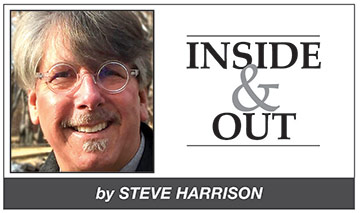Emotion: checks and balances

by Steve Harrison
Feelings aren’t new to me. I was a soft kid. A snowflake. Both terms are much nicer than some of the words thrown at me during my school days. My feelings began with developing empathy, often from what I read. The novel “Black Beauty” was a particularly difficult read for me in elementary school, my concern for the horse probably out of proportion for healthy development. I remember about the same time I was overly concerned that some illness I had might be transferred to our family dachshund. My emotions were difficult to deal with when I was young.
It didn’t seem like my family suffered the same. As I look back, I realize some of what I found difficult in dealing with my parents and their dealing with me came from their emotions — primarily fear of me or for me, I’m not quite sure which. Having a gay kid in the 1960s and ‘70s wasn’t a piece of cake, especially for people steeped in conservative, Christian ideology. My parents presented a much more stoic face than I ever did. My gayness was understood initially as my being too emotional.
My empathy made me a good reader and, I think, eventually a good teacher. I tried to understand and see all of my students, the popular ones and the wallflowers. When I was in school, I could understand fictional characters on an emotional level and surprisingly I wasn’t afraid of bringing my insight into a classroom setting, even when I was not seen as an authority on anything. I recognized giving voice to my emotional insight gave me some strength, a rare feeling for me when I was young. Later, I understood that I have a high emotional IQ.
I think I write these columns beginning with my feelings. The column started during Covid when my emotions ran high with John, the husband, and I in isolation worrying that those strange, little, round, bumpy, cartoon like germs might take root and rob us of our future. Having an outlet, a place to direct my feelings, was helpful to say the least.
Politics and newspapers have become home to more passionate ways of thinking than in generations before. Walter Cronkite would barely allow himself wiping away a tear when he announced JFK’s death. Reporting on politicians was done without feeling, nothing like the rapture laden discourse we find now on Fox or MSNBC. We looked to our politicians to bring dispassionate delivery and encouragement in the most frightening and trying of times. The most famous instruction being, “The only thing we have to fear is fear itself.” Keeping emotions buried or at least in check was desirable.
Now anything goes. Both houses of Congress can look like a very typical tense family gathering, when uncle Charlie has too much of a favorite spirit or shares too much opinion; people either bite their bloody tongue or participate in all-out war. Remember when we were taught to keep sex, politics, and personal finance to oneself? Now we must share our feelings and feel discriminated against if we can’t. Shows like the “Real Housewives” franchise are a good example of unhinged emotions; checks and balances are needed for sanity.
But too often, in an effort to come to terms with our feelings, only ours are allowed. And when confronted with rational thought or disagreeing emotions or need for perspective we are met with, “But guuuyyy, these are my feelings.” Emotions trump all. It’s hard to admit that sometimes feelings are not helpful or even real. Someone who can’t control their emotions just might not be good for certain jobs. My overly developed concern for animals makes me a very poor candidate to work at an animal shelter, and the guy who throws the Big Mac across the room may not be cut out to be close to those atomic bomb codes.









0 Comments